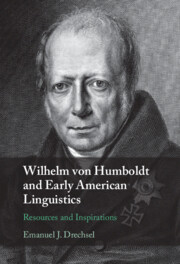
- Publisher:
- Cambridge University Press
- Online publication date:
- January 2024
- Print publication year:
- 2024
- Online ISBN:
- 9781108966801


Wilhelm von Humboldt (1767–1835), an early pioneer in the philosophy of language, linguistic and educational theory, was not only one of the first European linguists to identify human language as a rule-governed system –the foundational premise of Noam Chomsky's generative theory – or to reflect on cognition in studying language; he was also a major scholar of Indigenous American languages. However, with his famous naturalist brother Alexander 'stealing the show,' Humboldt's contributions to linguistics and anthropology have remained understudied in English until today. Drechsel's unique book addresses this gap by uncovering and examining Humboldt's influences on diverse issues in nineteenth-century American linguistics, from Peter S. Duponceau to the early Boasians, including Edward Sapir. This study shows how Humboldt's ideas have shaped the field in multiple ways. Shining a light on one of the early innovators of linguistics, it is essential reading for anyone interested in the history of the field.
‘In an agreeable style, and with an impressive depth of scholarly erudition, Drechsel argues cogently that Humboldt not only nourishes American linguistics but engaged in a mutually enlightening dialogue with American scholars. This contribution highlights the significance of Humboldt's thinking for linguistic anthropology worldwide, and will be welcomed by linguistics and translation scholars as a fine contribution to the new wave of Humboldt scholarship in Germany and the English-speaking world.’
James W. Underhill - Full Professor of Translation and Ethnolinguistics, University of Normandy
‘In this fascinating exploration of some of the most critical issues facing early American linguistic anthropology, Emanuel Drechsel has resuscitated von Humboldt as an incipient Americanist, sociolinguist, and field worker, who set the stage for much of the current theoretical work in linguistics and anthropology. His case for recasting linguistic relativity more accurately as the ‘Humboldt-Sapir-Whorf Hypothesis’ makes for fascinating reading alone, and clarifies much of the current debate.’
James Stanlaw - Professor of Anthropology at Illinois State University
 Loading metrics...
Loading metrics...
* Views captured on Cambridge Core between #date#. This data will be updated every 24 hours.
Usage data cannot currently be displayed.